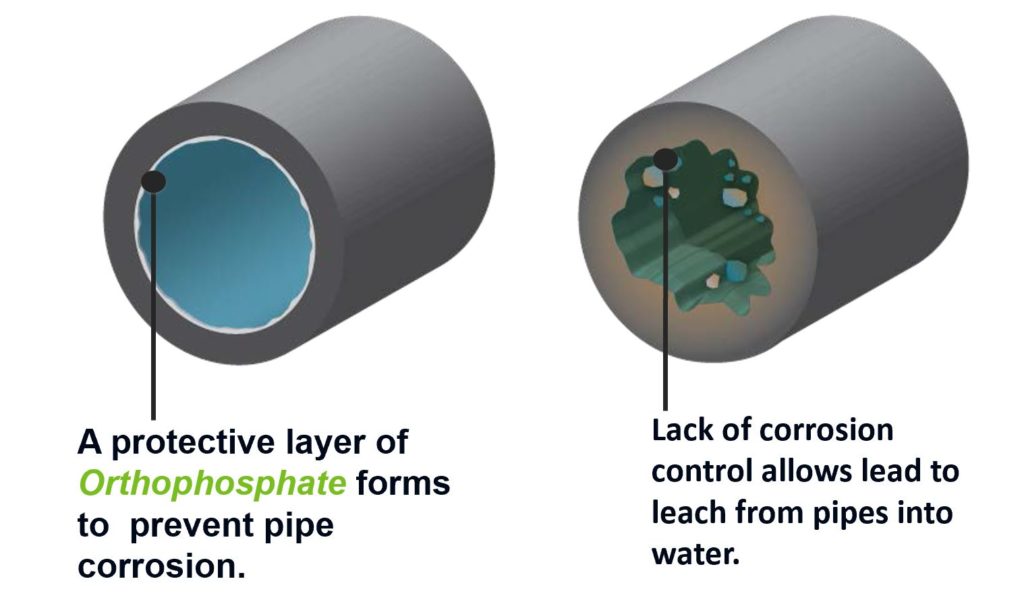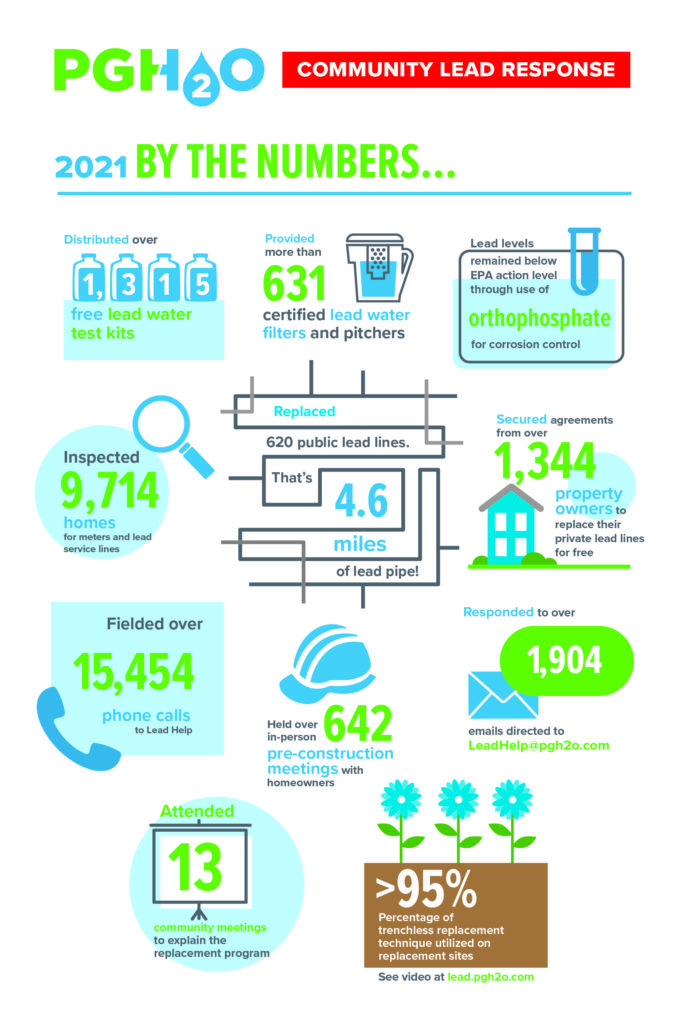Improved water treatment and lead service line replacements continue to address lead in water
Pittsburgh, PA – The most recent round of testing completed by the Pittsburgh Water and Sewer Authority (PWSA) shows lead levels below the state and federal action level of 15 parts per billion (ppb). This is PWSA’s third consecutive round of testing in which lead levels are in compliance. All water samples were taken at homes with a known lead service line or a historical record of a lead line. The results announced today indicate the continued effectiveness of adding orthophosphate to PWSA’s water treatment process.
The 90th percentile result of 7.05 ppb is below the U.S. Environmental Protection Agency (EPA) and Pennsylvania Department of Environmental Protection (DEP) lead action level of 15 ppb. Samples were taken at 136 residential locations between July and December of 2021. This result is only slightly above PWSA’s lowest lead testing result in over 20 years, 5.1 ppb, which was reported in July of 2020.
“We are pleased that the results of our compliance testing remain well below the action level, and we are continuing to refine our drinking water treatment process with the goal of reducing levels further,” said Chief Executive Officer Will Pickering. “Until we replace every lead service line in our system, we will remain focused on keeping lead levels low for every customer,” he added.
Since PWSA came back into full compliance with the Lead and Copper Rule in July of 2020, we have been working closely with national water quality experts to further optimize the water treatment process to maintain low lead levels. This effort ensures that PWSA’s drinking water meets all state and federal regulations, and our customers receive reliable, high-quality water.
Orthophosphate as Corrosion Control
In April 2019, we began adding orthophosphate to reduce lead levels in drinking water while continuing to replace thousands of lead service lines. Orthophosphate is a food-grade additive that forms a protective layer inside of lead service lines, creating a barrier between the lead pipes and the water flowing through them. It is approved by the EPA and successfully used in water systems across the world. Orthophosphate was selected by PWSA and approved by DEP after an extensive, year-long study of treatment alternatives.

2021 Accomplishments
PWSA completed a successful year of construction work replacing lead service lines and aging water mains throughout the service area. Replacing mains and service lines at the same time is a more cost-effective and wholistic approach to make these needed upgrades, leaving customers with completely new infrastructure, streets, and sidewalks at the end of a project.
Thanks to the hard work and dedication of our Lead Help Desk Staff, project team, and construction firms, over 9.1 miles of water mains and hundreds of lead lines were replaced in 10 neighborhoods.

Since the Community Lead Response’s inception in 2016, PWSA has replaced over 8,800 public lead service lines. It is estimated that there are approximately 8,000 lead service lines remaining in the system.
2022 Lead Programs
PWSA remains dedicated to removing all lead service lines from our water system, and will do so with several targeted programs in 2022. All planned water main and service line replacement work for the year is being financed with assistance from state and federal programs, like the Pennsylvania Infrastructure Investment Authority (PENNVEST) and the 2021 American Rescue Plan. These programs will save our ratepayers an estimated $77 million in 2022. The following programs are kicking off this calendar year:
2022 Neighborhood Lead Service Line Replacement
The City of Pittsburgh approved and provided $17.5 million to PWSA from the American Rescue Plan to target lead service line replacement. Construction crews will move through neighborhoods quickly and efficiently, replacing any lead service lines they discover. Funding is anticipated to replace approximately 725 lead service lines. Neighborhoods are currently being selected, with construction anticipated to begin in spring of 2022.
2022 Priority Lead Service Line Replacement
A program to identify and replace lead lines at day care facilities and locations with elevated lead samples will begin in spring of 2022. The project will target some of the most immediately at-risk residents with lead service lines. This work is made possible by a $4.7 million funding package from PENNVEST.
Small Diameter Water Main Replacement
This spring, we will complete the replacement of more than two miles of water main along Forbes and Fifth Avenue. This project, which began in May 2021, will upgrade water mains while other utilities make similar upgrades to their infrastructure.
Additional water main work is slated to begin in spring of 2022 to replace aging infrastructure and lead lines throughout our drinking water distribution system. This project will improve water reliability and safety by replacing approximately 8 miles of new water main and 900 service lines. More water main replacement work is currently under design and will be announced later in 2022.
Resources
- To learn more about PWSA’s Community Lead Response, visit lead.pgh2o.com
- To find a PWSA construction project near you, visit pgh2o.com/search-all-projects
